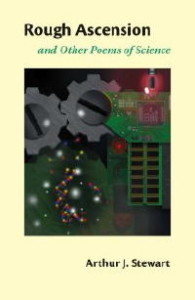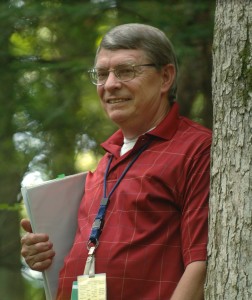 by Arthur J. Stewart
by Arthur J. Stewart
In this debut collection of fifty-two poems, scientist Arthur Stewart tries to nudge art and science a little closer by offering something tangible, something closer to the heart.
0-9658950-5-X
96 pages, soft cover
$15.00
Rough Ascension and Other Poems of Science
Author
 Arthur Stewart is an ecologist, senior scientist, essayist and poet. He graduated from Agua Fria Union High School and Northern Arizona University (B.S. and M.S. degrees) before spending two years as a Peace Corps Volunteer in Ghana. Upon returning to the U.S., he completed a Ph.D. in limnology at Michigan State University and a postdoctoral fellowship at the Department of Energy’s Oak Ridge National Laboratory, in Oak Ridge, Tennessee. He taught aquatic ecology and conducted stream-ecology studies as an Assistant Professor at the University of Oklahoma for three years before returning to Oak Ridge National Laboratory to work as an aquatic ecologist and ecotoxicologist. He has authored or co-authored more than sixty articles and book chapters, and has served as editor or associate editor for Environmental Toxicology and Chemistry, Journal of the North American Benthological Society, and Ecotoxicology. He is an Adjunct Research Professor at the University of Tennessee, and lives in Lenoir City. Rough Ascension and Other Poems of Science is his first book of poetry.
Arthur Stewart is an ecologist, senior scientist, essayist and poet. He graduated from Agua Fria Union High School and Northern Arizona University (B.S. and M.S. degrees) before spending two years as a Peace Corps Volunteer in Ghana. Upon returning to the U.S., he completed a Ph.D. in limnology at Michigan State University and a postdoctoral fellowship at the Department of Energy’s Oak Ridge National Laboratory, in Oak Ridge, Tennessee. He taught aquatic ecology and conducted stream-ecology studies as an Assistant Professor at the University of Oklahoma for three years before returning to Oak Ridge National Laboratory to work as an aquatic ecologist and ecotoxicologist. He has authored or co-authored more than sixty articles and book chapters, and has served as editor or associate editor for Environmental Toxicology and Chemistry, Journal of the North American Benthological Society, and Ecotoxicology. He is an Adjunct Research Professor at the University of Tennessee, and lives in Lenoir City. Rough Ascension and Other Poems of Science is his first book of poetry.
top of page
Reviews
“Poetry as a way of knowing is how I would describe this wonderfully readable first collection. In Rough Ascension and Other Poems, the deep tie between poetry and science comes to life. There are poems that report and poems that sing. The scientist and poet come together for our, the readers’, pleasure.”
-Roald Hoffmann, Nobel Laureate,
chemist, and poet, Cornell University.
“Art Stewart’s heart-stopping poems frame-shift between the intellect and the heart. The author can think
like an alga, or a molecule. His poems convey empathy with nature, reverence for truth, and tenderness
for humans as they glimpse beyond the ordinary to see ‘the sky peeled back too, giving stars.'”
-Mary E. Power, John and Mary Gompertz
Professor of Integrative Biology,
University of California, Berkeley.
“Art Stewart’s poems ring with finely made images gleaned with the careful eye of a scientist. His ear is tuned to the metaphoric resonance of the scientific vocabulary -he understands the great untapped resource of imagination within the discipline, a resource which the professional strictures of science may not fully value. He is a good-hearted provocateur within the culture of science, an authentic new voice in the culture of poetry.”
-Alison Hawthorne Deming, poet, essayist, and
recipient of the 1993 Walt Whitman Award of
the Academy of American Poets.
Excerpts
Technological Progress
I tell my sons, you must learn
to insinuate yourself into the world:
you must learn to work
in, amongst and through
the molecularity of being; you must learn
how to push the delicate
threads of the self into pixels,
energy fields, Gaussian curves, the step-
functions of life; you must
come to understand uncertainty,
the silly prancing dance of neutrons,
electrons, and learn how to surf
advances in new materials: blue lasers,
solid-state biphasic epsilonic wavelets,
quantum computing, nano-scale fabrication:
a propensity of density,
oh yes, wonderful things
beyond my comprehension. It’s time
I say for your dad to fall
behind the curve. And don’t forget
I say to love.
Weaver’s Needle
Do not dangle your participles or split infinitives,
my wild-haired high-school English teacher said.
She could build sentences from the cool dry breeze
that worked the walls of the ragged canyons
deep in the Superstition Mountains, where even now
the red sun dips behind the Weaver’s Needle.
Do not, she said,
use words you do not know.
Never circle a clean center with fuzz.
Her voice, we said,
quivered like the call of a thin coyote,
adding nearly nothing to the morning air.
Now my skin tingles, my ear strains
for the last trembling note of her. She leans
forward in my memory: her gold wire-rim glasses rest
precariously upon the narrow bridge of her thin nose.
She’s serious; she puts her stare
hard to each of us trying to teach us
something fundamental.
We sit, dolts, hopeless even by our own accounting.
One of us might become something useful-
somehow, someday, by accident, or luck
or divine intervention. She hesitates,
building a web of love in her mind as we sit,
our thoughtless little heads bowed
in acquiescence, incapable of learning
but appreciative of her attempt to teach us
things she thought had value.
After class that day we filed out
silent, one after another, ragamuffin whipped.
But in the school’s locker-lined hall
we soon gathered the strength of youth again:
safe in that brick canyon
with familiar metal echoes,
we lined up three deep and howled
like coyotes.
Superstring Theory
Rests on convoluted
ten-dimensional arguments with three
exposed, and the remaining
seven folded up in themselves
to a size no bigger than ten to the minus
33 centimeters, requiring 20 million times
more energy than that which can be produced
in the highest-energy particle colliders available,
just to see if
forces are tied at the core or can unite.
Relax the assumptions a bit,
suddenly everything makes sense:
the weak force
unites with gravity,
flowers bloom,
professors dance.
Beautiful Fish
After catching two small trout
casting with flies, the last of the sun
speckled them more and we walked
carrying them over stones as dusk slipped
among willows where the Delores River
slipped among stones. We cut
willow whips, stripped them and pushed
their pointed ends through the fish
mouth to tail and hung them
over a small fi re roasting,
a few drips sputtering
now and then making sparks
jump in the smoke. We ate
those beautiful fish, peeling back
blackened skin
picking white flesh from delicate bones
between head and tail.
And they gave the river to us
completely that night, and the sky
peeled back too, giving stars.
Uncle Eddie Nails the Blues
1.
Uncle Eddie was a fount of knowledge
our mothers didn’t like.
He wasn’t the uncle of any of us, either.
But with his snaggle-toothed mouth
gnawing the air
he’d spill the beans while his eyes
glittered a smirk on his mouth. He told us
the best way for a man to practice
birth control was to put a small
pebble in his shoe:
guaranteed to make him limp.
And he said the best way for girls
was for them to hold
an aspirin between their knees.
2.
On Fridays when he got drunk enough to sing
he’d stand on the porch
wobble-kneed and belt it out
over the hay-field. Lilacs
could wilt under his whisky-breath
and the full moon
rising seemed to waver. The stubby glass
held Four Roses on a good week.
3.
When he laid down his last
tune and died in spring
it was too early to sing
to a rising moon. We straggled
under a damp day
so far from what he was, pale
sun so thin it scarcely cast a shadow
from one headstone
to the next. And the songs
we sang then were nothing at all
like the ones he sang
teetering on the porch at dark.